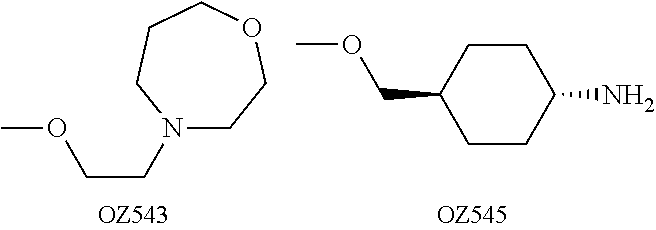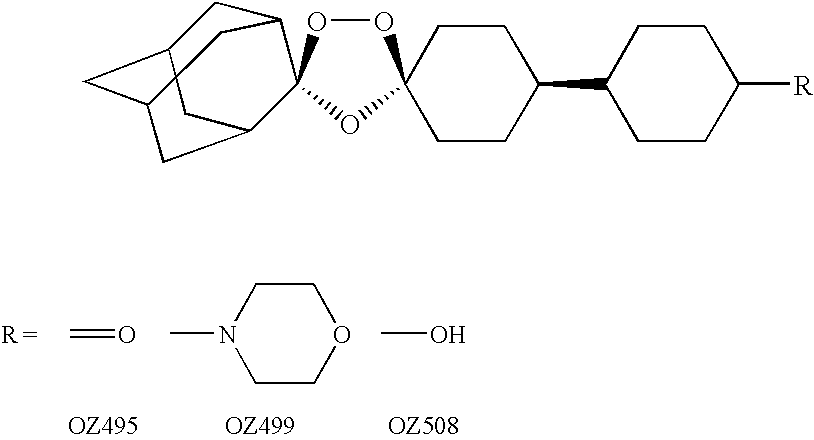Dispiro 1,2,4-trioxolane antimalarials
a technology of trioxolane and dispiro, which is applied in the field of compositions and methods for treating malaria, can solve the problems of inability to prevent disease recurrence, difficult treatment of malaria, and exhausted infected individuals, and achieves the effects of easy and inexpensive synthesizing, excellent potency and efficacy
- Summary
- Abstract
- Description
- Claims
- Application Information
AI Technical Summary
Benefits of technology
Problems solved by technology
Method used
Image
Examples
second embodiment
In the invention, the compounds have the following structure:
[0031]
third embodiment
In the invention, the compounds have the following structure:
[0032]
[0033]Preferred compounds of the present invention identified thus far include:
[0034]-cis-adamantane-2-spiro-3′-8′-[4′-[2′-(4′-morpholinyl)ethoxy]phenyl]-1′,2′,4′-trioxaspiro[4.5]decane mesylate (OZ439);
[0035]-cis-Adamantane-2-spiro-3′-8′-[4′-[3′-(4′-morpholinyl)propoxy]phenyl]-1′,2′,4′-trioxaspiro[4.5]decane mesylate (OZ461);
[0036]-cis-Adamantane-2-spiro-3′-8′-[4′-[3′-(4′-thiomorpholinyl)propoxy]phenyl]-1′,2′,4′-trioxaspiro[4.5]decane mesylate (OZ462);
[0037]-cis-Adamantane-2-spiro-3′-8′-[4′-[3′-(1′-oxido-4′-morpholinyl)propoxy]phenyl]-1′,2′,4′-trioxaspiro[4.5]decane mesylate (OZ466);
[0038]-cis-Adamantane-2-spiro-3′-8′-[4′-[3′-[4′-(methylsulfonyl)-1′-piperazinyl]propoxy]phenyl]-1′,2′,4′-trioxaspiro[4.5]decane p-tosylate (OZ482);
[0039]-cis-Adamantane-2-spiro-3′-8′-[4′-(cis-4′-aminocyclohexyloxy)phenyl]-1′,2′,4′-trioxaspiro[4.5]decane mesylate (OZ493);
[0040]-cis-Adamantane-2-spiro-3′-8′-[4′-(4′-morpholinyl)cyclohexyl]-...
example 1
Antimalarial Activity
[0073]Activity of 1,2,4-trioxolanes against P. falciparum in vitro. Each trioxolane was screened against the chloroquine-resistant K1 and chloroquine-sensitive NF54 strains of Plasmodium falciparum in vitro.
[0074]Activity of 1,2,4-trioxolanes against P. berghei in vivo. In the single dose in vivo screen, NMRI mice infected with the ANKA strain of P. berghei (groups of five mice) were treated one day post-infection with trioxolanes dissolved or suspended in standard suspending vehicle (SSV). The SSV consists of either 0.5% w / v carboxymethyl cellulose, 0.5% v / v benzyl alcohol, 0.4% v / v Tween 80, and 0.9% w / v sodium chloride in water or 0.5% hydroxypropylmethylcellulose 0.4% v / s Tween 80, and 0.5% v / v benzyl alcohol in water. Trioxolanes were administered as single po 30 mg / kg doses. Antimalarial activity was measured by percent reduction in parasitemia on day three post-infection and survival times compared to an untreated control group. Survival to day 30 post-in...
PUM
| Property | Measurement | Unit |
|---|---|---|
| compositions | aaaaa | aaaaa |
| transmission | aaaaa | aaaaa |
| resistance | aaaaa | aaaaa |
Abstract
Description
Claims
Application Information
 Login to View More
Login to View More - R&D
- Intellectual Property
- Life Sciences
- Materials
- Tech Scout
- Unparalleled Data Quality
- Higher Quality Content
- 60% Fewer Hallucinations
Browse by: Latest US Patents, China's latest patents, Technical Efficacy Thesaurus, Application Domain, Technology Topic, Popular Technical Reports.
© 2025 PatSnap. All rights reserved.Legal|Privacy policy|Modern Slavery Act Transparency Statement|Sitemap|About US| Contact US: help@patsnap.com



